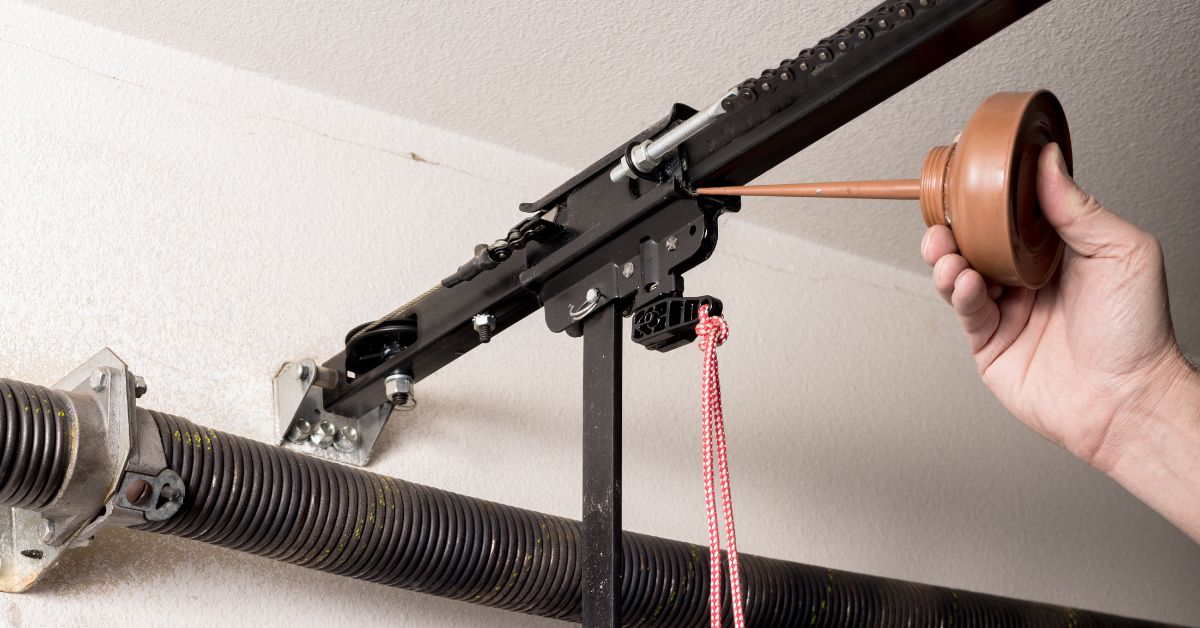Lubrication 101: The Importance of Keeping Your Garage Door Moving Smoothly

Is your garage door producing excessive noise during operation? Those sounds aren’t just giving your neighbors something to complain about–they’re your door’s desperate cry for help.
When was the last time you gave all those moving parts some TLC? Most homeowners completely forget this simple maintenance task until things get noisy or sticky.
Proper garage door lubrication doesn’t just quiet things down. It’s absolutely essential for smooth operation and adds years to your door’s working life. This quick guide from your friends at Thomas V. Giel Garage Doors breaks down everything you need to know to keep things running smoothly and silently.
Why Lubrication is Non-Negotiable for Smooth Movement
The massive panel on your garage doors goes up and down several times daily, which is a lot of movement. Without good lubrication, all those metal parts (think hinge pins and roller bearings) rub directly against each other. Metal-on-metal contact creates serious friction. That friction could be the cause of the unpleasant noise you hear when you hit the opener button.
Preventing Wear and Problems
But noise is just the first warning sign. The real trouble starts when that friction makes your door move in jerky, stop-start motions. Components wear down way faster than they should. Your opener motor strains harder than necessary, shortening its life.
Before you know it, one worn part puts stress on another, and another, creating a domino effect of garage door problems.
A Protective Barrier
Good lubrication creates a protective barrier between moving parts. It lets everything glide together smoothly, the way the manufacturer intended. Keeping those parts slippery dramatically reduces strain across the entire system and is vital garage door maintenance.
Wouldn’t you rather spend five minutes with a spray can twice a year than deal with a completely broken door at the worst possible moment?
Choosing the Right Lubricant (and Avoiding the Wrong One!)
First, let’s talk about what NOT to use. Toss that can of regular WD-40 back in the drawer. Most folks reach for it automatically, but here’s the truth: standard WD-40 isn’t actually a true lubricant for this job.
It’s more of a cleaner and water displacer (that’s what the “WD” stands for!). Sure, it might quiet things down for a few days, but it’ll actually wash away the good grease your door needs. Even worse, it turns into a dust magnet over time, creating a gritty mess that makes your original problem worse.
Your Best Lubricant Choices
So what should you use instead? You’ve got two solid options:
- White Lithium Grease: Ideal for metal-on-metal contact points (hinges, opener chain/screw) because it clings well, offering durable protection.
- Silicone Spray (Garage-Door Specific): Excellent for roller bearings and locks, as it penetrates tight spaces and attracts less dust – a real advantage in most garage environments.
The How-To: Lubricating Key Components Effectively
Got your lubricant ready? Great! Now let’s get down to the actual job. But before you start spraying everything in sight, there are a few tricks to doing this right.
Remember, safety first. Unplug your garage door opener or disconnect it using the emergency release cord. The last thing you want is the door suddenly deciding to move while your fingers are near the hinges.
Next, grab some rags and wipe down all the parts you plan to lubricate. Why bother with this step? Because adding fresh lube on top of old dirt just creates a gunky, abrasive paste that actually makes things worse. A few minutes with a rag now saves headaches later.
Targeting the Right Spots
Apply your chosen lubricant sparingly to key areas:
- Hinge pivot points and steel roller bearings (use the spray straw for precision)
- Torsion springs (a light mist helps quiet them and resist corrosion)
- Your opener’s chain or screw drive (check your manual first)
- The moving parts of the lock assembly.
- Immediately wipe away any excess lubricant to prevent drips and keep it from attracting dirt.
What to Avoid Lubricating
Crucially, never lubricate the garage door tracks. This attracts performance-hindering grit. Also, avoid lubing nylon rollers or belt drive opener belts; simply keep tracks clean and dry.
Once done, operate the door manually a few times to distribute the lubricant. Listen closely–you should notice a pleasing difference in the sound almost immediately.
Conclusion
So there you have it, lubricating your garage door isn’t too difficult, and it’s a maintenance task that pays off big time. Have you ever thought about how much a full garage door replacement costs these days? Regular lubrication helps you avoid that expense for years longer than you’d expect.
If you’re not feeling handy with this stuff, the pros at Thomas V. Giel Garage Doors are just a phone call away. We’re happy to handle this maintenance as part of a complete door tune-up that keeps everything running like clockwork.
